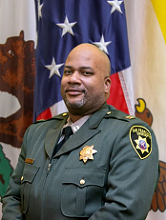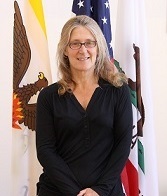Sheriff's Administration and Programs Division

Administration and Programs Division
Kevin Thaddeus Fisher-Paulson, Chief Deputy Sheriff
The Administration and Programs Division is commanded by a chief deputy sheriff. This chief works with two captains and a program administrator to manage three aspects of the department: the administration of all operations; rehabilitation programs and alternatives to incarceration.
The Administration function includes: background investigations & jail clearances; color guard/honor guard; criminal investigation; fleet & communication; peer support & the chaplaincy; personnel and training.
Rehabilitation Programs are provided as a continuum to both the incarcerated and to members of the community at risk of offending or re-offending. They consist of education, vocational training, substance abuse treatment and batterers’ intervention classes as well as a variety of therapies including art, theater and sewing. The Department has been recognized nationally for innovative interventions in our efforts to improve public safety by reducing crime in the community. These interventions include the first charter high school embedded within the walls of an adult detention facility (the San Francisco Sheriff’s Department Five Keys Charter High School); the Resolve to Stop the Violence (RSVP) project, an anti-violence initiative which was the recipient of the 2004 Harvard Ash Award and the Sisters in Sober Treatment Empowered by Recovery (SISTERS).
Through Community Programs, sworn employees provide alternatives to incarceration to eligible offenders in the San Francisco criminal justice systems, including electronic monitoring and community service through the Sheriff’s Work Alternative Program (SWAP). These options allow individuals to foster family, employment and social relationships while insuring that the citizenry is kept safe. Participants are encouraged to engage in a spectrum of rehabilitation services including parenting classes, art therapy and vocational guidance.
The Department also offers alternatives to pretrial incarceration. The intended outcome is to afford defendants the opportunity to reconnect with family, employment and social relationships while meeting the requirements of the court and minimizing the risk to public safety. The SFSD Pretrial alternatives include: Own Recognizance Release, Homeless Release Project and Supervised Pretrial Release.
Community Programs sworn employees facilitate the transportation of sentenced individuals who are committed to residential treatment.
Also managed by Community Programs is the No Violence Alliance (NoVA) project, an initiative that provides intensive case management in the form of housing, career and counseling services to offenders with a propensity for violence. The intent is to mitigate physical and social conflict within the community as a whole.
These trend-setting programs afford almost half of all arrested persons in San Francisco the opportunity to enhance family and community ties while fulfilling their legal responsibilities to the criminal justice system.
To learn more about our programs and services, please visit our home page.

Administrative Unit
Jamala Sanford, Sheriff's Captain
The Administrative Unit conducts operation in support of the entire Department, including background investigations & jail clearances; color guard/honor guard; criminal investigation; fleet & communication; peer support & the chaplaincy; personnel and training. Personnel functions include community recruitment, testing, hiring and facilitation of the promotion process.

Director of Programs
Ali Riker
Through Programs, the Department addresses the root causes of criminal behavior and provides opportunities for each individual to make a better choice for the future. The focus is on wraparound services that help the individual (both in and out of custody) to re-connect and contribute to family and community. In-custody programs include the San Francisco Sheriff’s Department Five Keys Charter High School; Resolve to Stop the Violence Project (RSVP); Roads to Recovery; Sisters in Sober Treatment Empowered by Recovery (SISTERS) and parenting classes.
Community Programs Unit
Alejandro Cabebe, Sheriff's Captain
The primary purpose of Community Programs is to ensure public safety through alternatives to incarceration, crime prevention programs and services to survivors of violent crime. The practices of Restorative Justice seek to offer rehabilitation to offenders as well as support to the victims and the community as a whole.
The sworn and non-sworn employees of Community Programs collaborate with criminal justice agencies as well as community-based organizations to provide a spectrum of coordinated service delivery. Sworn employees work in concert with civilians to develop targeted case management.
Platforms within Community Programs include:
- ELECTRONIC MONITORING (EM)
- SHERIFF’S WORK ALTERNATIVE PROGRAM (SWAP)
- NO VIOLENCE ALLIANCE (NoVA) PROJECT
- COMMUNITY PROGRAMS STATISTICS
- 2015 ANNUAL REPORT NUMBERS
- COMMUNITY PROGRAMS ANNUAL REPORT
- ANNUAL REPORT FOR ALTERNATIVES TO PRE-TRIAL INCARCERATION
- DEPARTMENT OF HEALTH CARE SERVICES CERTIFICATION
Community Programs Class Schedule:
Women's Resource Center (930 Bryant Street)
Client Check In (9:00 am to 9:30 am)
5 Keys Charter School (Monday, Wednesday, and Friday 8:30 am to 12 pm, Tuesday and Thursday 8:30 am to 11 am)
This is part of the charter school that provides participants with high school credit classes and/or independent studies with the goal of earning a high school diploma or GED.
Healthy Relationships (Mondays 12:15 pm to 1:30 pm)
This class teaches the tools to develop healthy relationships, boundaries, visualize red flags and how to respond to conflict. This group examines the views of how partners are sometimes chosen as a result of unhealed trauma. It may include drumming, humming and other forms of meditation.
Computer Lab (Monday Open to Client's All Day)
Acupuncture (Tuesday 9:00 am to 1:00 pm)
Embodying Wellbeing Supporting Safety (Tuesday 11:00 am to 12:00 pm)
This group for women focuses on creating safety, and provides skills to establish and maintain stability. A place to look at trauma, and support emphasizing each other’s strength and resilience. This group is also sponsored by CIIS. It talks about how individuals hold tension and how to relieve the physical stress that has resulted from trauma.
Computer Lab (Tuesday 12:00 pm to 4:00 pm)
Relapse Prevention (Wednesdays 10:00 to 11:00 am)
This focuses on setting goal and identifying triggers including ways to maintain sobriety. As an open cohort, this group relies on the sponsorship of individual struggle.
NA Meeting (Wednesdays 11:30 am to 12:30 pm)
Parenting (Wednesdays 1:00 to 3:00pm)
This group is certified for parenting to allow participants credit with San Francisco City & County Human Services Agency, with an emphasis on family re-unification. It is sponsored by the Community Works and includes age-appropriate interaction strategies and childhood development theory/practice.
Next Course Cooking Breakfast Circle (Thursdays 9:00 to 11:00 am)
The class focuses on cooking geared towards healthy nutritious meals on a tight budget. IT includes hot plate and microwave meal preparation. In this group, women have the opportunity to “break bread” together and share successes as well as challenges.
Anger Management (Fridays 10:00 to 11:30am)
This is a certified 12 week cognitive behavior anger management treatment class. Therapies include conflict resolution, role-playing and alternatives to situational stress.
Craft Time - Sewing, Jewelry Making, Knitting, Crochet (Fridays 1:00 to 3:00 pm)
In the tradition of folk art, these are open sewing classes for repair, creation and/or sharing creations. Women learn pattern-making, fashion realization and the building of machine skills. Shared story-telling is part of the process of craft making, and bolsters the empowerment of all women in the group.
Employment Search & Support (Individual Appointments Available)
Students focus on job and housing searches. Resume assistance is also available.
70 Oak Grove
5 Keys Charter School (Monday through Friday 8:00 am to 3:00 pm)
Students 17 years and older are invited to attend an orientation, where they create an individualized learning plan based on education needs and previously earned credits. As over 1,000 Five Keys students have proved, it is never too late to graduate from high school.
Manalive (Mondays/Wednesdays 10:00 am to 12:30 pm)
The Resolve to Stop the Violence Project (RSVP) manages this 52-week certified program provided for batterers with the intent of preventing domestic violence. Manalive or Men Allied Nationally Against Living in Violent Environments focuses on what violence is, where it comes from and how to stop it. The program is a peer-based re-education program with an emphasis on how we learn violence from our peers, and therefore, how we can un-learn it.
Alcohol Anonymous (Mondays 6:00 to 7:00 pm)
This is an open 12 step meeting for men and women
Substance Abuse Pretrial (Mondays 1:00 to 2:00 pm)
This class focuses on persons with addiction disorders who are participating in the Sheriff's Pretrial Release program. It teaches how to come to an understanding of how to live without the use of drugs and alcohol.
Men's Mentoring Support Group (Tuesdays 9:00 to 10:30 am)
This is a group of male mentors providing support to the post-incarcerated males and community members in a safe place to come and share their struggles and successes in a supportive environment.
M3 Cisco Academy (Tuesdays 12:30 to 2:30 pm)
This class focuses on development of job-ready skills and a solid foundation in the fundamentals of computer networking and technologies.
COVER (Tuesdays/Thursdays 6:00-7:00 pm)
The Community of Veterans Engaged in Restoration post-release support group provides veterans with education, vocational, legal and therapeutic services.
Harm Reduction (Wednesdays 9:00 to 10:00 am)
This class provides an environment where people can come and be heard and receive and offer support and feedback. It is facilitated from a position of non-judgmental, radical inclusions.
Dual Diagnosis (Wednesdays 11:00 am to 12:00 pm)
This class freely encourages people to explore alcohol and drug use as well as mental health symptoms, employing both abstinence and harm reduction models.
Thinking for a Change (Wednesdays 1:00 to 2:30 pm)
This is an integrated, cognitive behavior change curriculum for offenders and ex-offenders that includes cognitive restructuring, social skills development and problem solving. This is a closed cohort, 28 session class (1 ½ hour class twice a week for fourteen weeks.
Anger Management (Wednesdays 3:30 to 4:30 pm)
This class provides a safe and supportive environment that fosters learning of new Anger Management skills and techniques.
Substance Abuse (Wednesdays 5:00 to 6:30 pm)
In this class, participants study the concepts of addiction and psychological dependence, and are encouraged to take a deeper look into their thought processes.
Latino Support Group (Thursdays 1:00 to 2:30 pm)
This class focuses on the trajectory from a generational history and experience from Mexico, Central American and South America.
Parenting (Thursdays 6:00 to 8:00pm)
This group is certified for parenting to allow participants credit with San Francisco City & County Human Services Agency, with an emphasis on family re-unification.
Voices on the Rise (Mondays and Wednesdays 2:30 to 4:00 pm)
The Restorative Justice Expressive Arts class offers men 18-25 years old an opportunity, through creative writing and spoken word, to examine themselves and to look at the full impact of their actions on their victims, their families and the community. Through public performances, the young men are provided an opportunity to reconnect, repair the harm and begin to heal.
ELECTRONIC MONITORING (EM)
Electronic Monitoring allows the Department to supervise remotely individuals who would otherwise be in custody. Devices provide information to track the individual’s location and/or consumption of alcohol. A case manager works with the individual to develop schedules appropriate for rehabilitation, including family time, work, education, therapy and community-building. Individuals are monitored on a continuous cycle and relevant alerts are forwarded to sworn employees in case of the need for intervention to insure public safety.
SHERIFF’S WORK ALTERNATIVE PROGRAM (SWAP)
The Sheriff’s Work Alternative Program provides sentenced offenders the opportunity to perform meaningful community service in lieu of incarceration. These projects include art initiatives, education, urban re-forestation, recycling and graffiti abatement. The sentenced offenders must meet eligibility and risk criteria. Participants work a minimum of two days a week in fulfilling their commitments.
NO VIOLENCE ALLIANCE PROJECT (NoVA)
The goal of the No Violence Alliance Project is to mitigate violent crime in the community. The Department provides services for post-incarcerated individuals who have a propensity of violence, with the objective of successful community reentry. Sworn and civilian professionals provide post-release intensive case management in the form of housing, career and counseling services. Participation is voluntary, and an incentive for involvement includes eligibility for residential and transitional housing.
